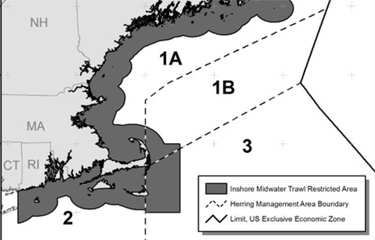US Northeast midwater trawl exclusion zone won’t be enforced – for now

The inshore waters of the U.S. region of New England are effectively open again for midwater trawling, after the National Marine Fisheries Service decided not to enforce the exclusion zone struck down by a federal court ruling.
In an email advisory Thursday, NMFS officials said a 29 March order by U.S. District Court Judge Leo Sorokin now means the restricted area regulations – a key feature of Amendment 8 to the Atlantic Herring Fishery Management Plan – means “the inshore midwater trawl restricted area regulations are not in effect and will not be enforced.”
“NOAA Fisheries retains its opportunity to seek review of the court's vacatur order, including seeking a stay of the court's vacatur order pending appeal, and is considering its options,” according to the agency statement.
The order followed an opinion Sorokin handed down 4 March in a case brought by the Sustainable Fisheries Coalition, a trade group representing companies that fish for herring and mackerel.
Those midwater trawl vessel operators sought to turn back NMFS approval in November 2019 of a New England Fishery Management Council-approved measure creating an exclusion zone for mid-water trawling 12 miles offshore – with a bump out to 20 miles east of Cape Cod.
That off-limits designation came after two decades of debate over the impact of midwater trawling, and complaints from other fishermen that it caused “localized depletion” of forage fish, disrupting ecosystems and their seasonal access to groundfish, tuna, and other species.
Sorokin was unconvinced by NMFS’ defense of its decision.
“A primary purpose of the rule is to ‘minimize local depletion and its associated user group conflict when midwater trawl vessels harvesting herring overlap with other user groups,’” the judge wrote. Yet NMFS “could not identify any scientific evidence of localized depletion, let alone establish a link between MWT vessels and localized depletion.”
Like NMFS, supporters of the exclusion zone rules are mulling their next legal moves.
“I’m urging everyone I can find in federal management, joined by allies who supported our effort, to appeal,” Cape Cod Commercial Fishermen’s Alliance Executive Director John Pappalardo wrote in the group’s online newsletter after the court order was issued.
Reporting by Kirk Moore
Image courtesy of NMFS





Share